In the ring
The final countdown begins
Welcome to a Sunday edition of The Mexpatriate.
One week from today, Mexicans will vote in the largest elections in the country’s history, choosing not only a new president but also governors in eight states, the mayor of Mexico City, federal legislators and thousands of state and municipal positions.
In today’s edition I focus first on the presidential candidates’ performances at the recent debates, and then the latest polling as we head into the final countdown.
“No more debate about debates”
While to debate or not to debate has been a news item in the U.S. election cycle, Mexico’s three presidential candidates had no choice but to face off in three legally required debates in April and May.
So what purpose do debates serve in political campaigns today?
This question has surfaced a lot in recent years, as the quality of civic discourse in the internet age has declined. There was general surprise when Biden and Trump agreed to their first debate on June 27, after skepticism from both camps (and the comment quoted above from the Biden campaign). Trump was notably absent from the Republican Primary debates last year, and both campaigns pulled out of the 2024 schedule proposed by the nonpartisan Commission on Presidential Debates (CPD), which has been organizing these debates since 1988.
The first televised presidential debates in U.S. history in 1960 between John F. Kennedy and Richard Nixon were a turning point in modern democratic politics. And we may be closing in on another as we move deeper into the internet age.
Candidates are far more accessible than before—via their social media accounts or expounding their ideas in long podcast interviews. Their political platforms are a click away on their websites. Debates no longer serve to introduce the candidates and their viewpoints to the world, and their effect on polls and voter behavior is…debatable. According to one poll, 92% of respondents said after the second Mexican presidential debate that they wouldn’t change their vote.
Perhaps it's better to think of them as trials by combat, like those that medieval champions were put through, or as a lucha libre wrestling match. There are protocols and rules (made to be broken at times), and while pundits shake their heads and lament the juvenile insults and personal attacks, I wonder: Could this be what the audience came for?
If most voters see politics either through the lens of self-interest or identity, rather than a philosophical one, as suggested by ever-astute political analyst Nate Silver, then debates are more akin to competitive sporting events than a “battle of ideas.” You know which team you’re cheering on, and which team you want to see fumble.
Thirty years ago this month, Mexicans watched the first presidential debate in the country’s history as Cuauhtémoc Cárdenas (PRD), Ernesto Zedillo (PRI) and Diego Fernández de Cevallos (PAN) faced off in an event that by today’s standards, sounds inordinately civilized. The PAN candidate was widely considered the winner, with some eloquent jabs at his opponents, neither of whom performed well, despite particularly lofty expectations of Cárdenas, a practiced orator.
In a memorable moment, Fernández de Cevallos took precise aim at Zedillo, saying that “with all due respect,” his candidacy was the outcome of two tragedies: first, the assassination of the previous PRI candidate, Luis Donaldo Colosio, less then two months earlier, and the second, the undemocratic PRI system of hand-picking presidential successors. “The first is not your fault,” said Fernández, “but the second disqualifies you.”
Zedillo went on to become president, but six years later, it would be another PAN politician, Vicente Fox, who ended seven decades of PRI rule.
Back to 2024: one analyst called the first debate “the worst I’ve seen” and another observed there was “more name-calling than in a middle school.” The rigidity of the format was partly to blame, with short time limits to address a dizzying array of complex topics, very light moderation and a lack of back-and-forth repartee between the candidates. No one was accused of soaring speech or rhetorical triumph.
However, viewership did surpass 2018 numbers. The second debate had 16.1 million viewers according to INE, and the final debate on May 19 was watched by 13.9 million. However, even the most-watched debate drew only about 16% of the number of eligible voters in Mexico this year (for comparison, around 30% of the number of eligible U.S. voters tuned in to the first Biden vs Trump debate in 2020).
Today I offer my own distillation of six hours of debate, an attempt to capture not just key proposals and quotes from each candidate, but also the ambiente and the aftermath. And the memes, of course.
Round one (April 7) - Healthcare, education, corruption
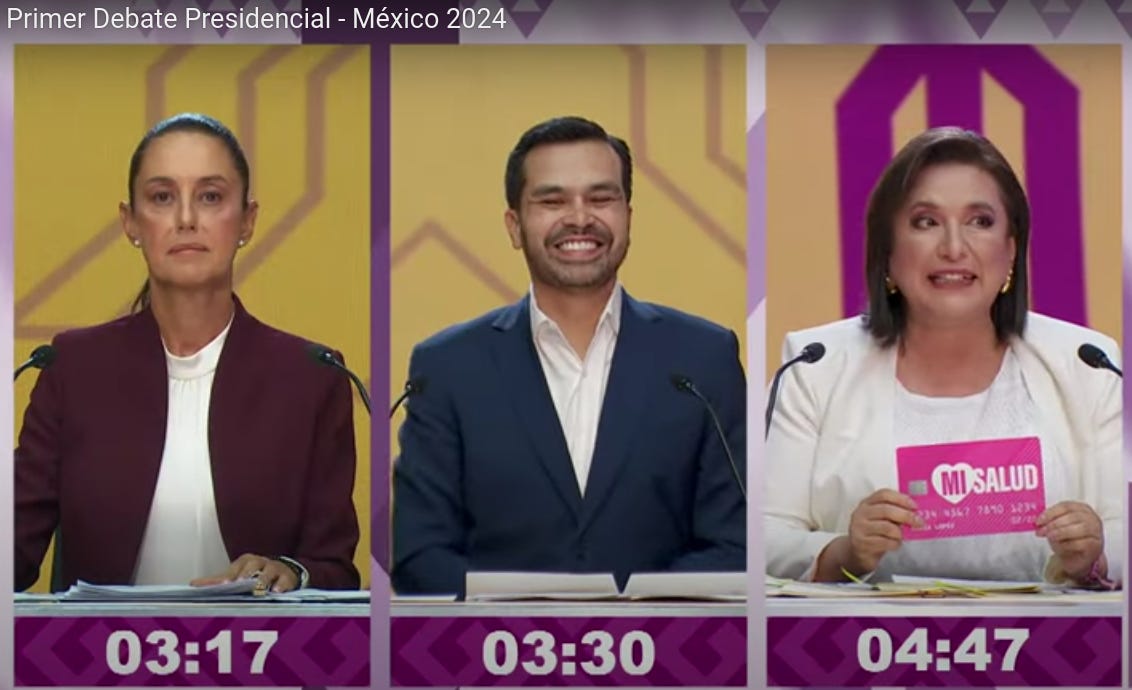
Key candidate proposals and statements:
Xóchitl Gálvez (PAN-PRI-PRD)
Gálvez attacked the Morena track record on healthcare and proposed a “smart card” as part of her healthcare program that would allow citizens to buy medications at “any pharmacy” and be treated in private or public hospitals. “Today there is blockchain technology that allows you to guarantee transparency and to combat corruption,” she said, adding “I am a woman who bets on technology.”
Gálvez said she would revive the full-time school program that was shut down during AMLO’s term, saying “no country progresses by studying less.” She also proposed offering “universal scholarships” to one-up the Morena candidate, by extending the program to private school students as well. “My pharaonic works [alluding to AMLO’s mega infrastructure projects] will be schools, hospitals and public safety.”
Gálvez launched multiple accusations of corruption at Sheinbaum and Morena, at one point saying the “evidence you present is even more fake than your tabasqueño accent.” In order to combat corruption, she proposed strengthening the national transparency agency (INAI) and said her government would be transparent as a “glass box.” In response to one citizen-submitted question, she said she’d take a lie-detector test while answering questions about her assets.
In her closing statement, Gálvez focused on her own character and identity as a woman with Indigenous roots and as an entrepreneur. “In me, you will have a president with character and capacity, who will always tell you the truth,” concluding with “I will defend Mexico for you and your children.”
Claudia Sheinbaum (Morena-PT-PVEM)
On healthcare, Sheinbaum said the country is “on the right track” with the IMSS programs and that her government would continue strengthening it, not by privatizing it, which she said has been shown to be “enormously corrupt.” Her proposal includes “prevention as a central focus.”
Sheinbaum said she has “defended public education” all her life and proposed expanding a scholarship program to all public school students starting in preschool, which she said she enacted in Mexico City as mayor with “great results.”
Sheinbaum accused Gálvez of corruption during her tenure as mayor of the Miguel Hidalgo borough of Mexico City, and quipped that her opponent even wanted to “steal the time bag [allotment]” after repeated technical issues with the debate clock caused arguments between the candidates. Sheinbaum confirmed she would continue AMLO’s policy of “republican austerity,” which she said means “eradicating the corruption and privileges of the governments of the PRIAN.” She claims this has saved the country 2.4 billion pesos. “We create rights, not privileges…and that’s how we will continue.”
In her closing statement, Sheinbaum focused on the results of Morena’s political project, the “Mexican humanism” which has “watered the economy from below” instead of above, saying “Mexico today is flourishing.” She called on citizens to join in the movement, concluding with: “I will be Mexico’s first presidenta.”
Jorge Álvarez Máynez (MC)
Máynez said that a prosperous Mexico includes a “universal healthcare system that is actually universal” and said that artificial intelligence could be utilized to better manage how medications are purchased and distributed by the government.
Máynez frequently said he would focus on Mexico’s children, and said “in the old politics, children don’t matter because they don’t vote. I say for the good of all, but first the children, to paraphrase the president…we are going to put boys and girls at the center” of education strategy.
On corruption, Máynez said “corruption is a system; a system built precisely on the relationship between money and political power.” In addition to building an “accountability system,” Máynez said his government would be the first in history to enter office “without commitments made to interest groups.”
In his closing statement, Máynez focused on the voter as a vehicle for change, saying that “this country will not change with a new president or a new party, we are all going to change it together.” He concluded: “I don’t want to be the best president of Mexico, I want to be president of the best Mexico.”
Meme-worthy moments:
Gálvez passionately spoke about defending the Mexican people in her closing statement while holding up the Mexican flag…upside down. Oddly, she doubled down on this following the debate and the ensuing meme-storm, saying that it wasn’t an accident, but supposed to symbolize a protest of the status quo in Mexico.
Gálvez also inspired this meme, after repeatedly accusing Sheinbaum of being “heartless” and dubbing her “the ice lady”:
Máynez probably inspired the most memes of all, mostly riffs on his oddly fixed grin, but also the moment when he signed to the audience (in the meme, he signs “Let’s go get some beers”):
Post-game analysis:
The consensus from the “comentocracia” was that Sheinbaum easily won this round, and in a flash poll, El País found that 46% of respondents agreed. Gálvez seemed nervous (she later admitted as much, and said she was uncomfortable dressed in a suit instead of her usual huipil). A few quotes from analysts below:
“Sheinbaum was presidential, professional, calm and confident.”
“Sheinbaum won not because she was the best, but because the other two were infinitely bad.”
“The biggest loser of this debate was the audience, victim of a boring, confusing encounter without clear proposals.”
“The best part of the debate, by far, was the memes.”
Round two (April 28) - Economic growth, energy and environment, infrastructure

Key candidate proposals and statements:
Claudia Sheinbaum
Sheinbaum started out by saying “the economic model of the country changed” in 2018, that “neoliberalism, represented by the PRIAN candidate, was a disaster,” and that she will move ahead with the progress already made by AMLO. “That’s what the transformation is about, there is a plan and development.” Sheinbaum said that poverty and inequality reduction are the areas “where the 4T has had the biggest results,” and highlighted social programs like senior pensions, and increases in the minimum wage, which have “transformed the lives of millions.” She also promised to build 100 industrial parks to capitalize on nearshoring, extend social security benefits to agricultural day laborers and build 1 million homes to generate “2 million jobs in the next sexenio.”
Sheinbaum said that while she plans to expand renewable energy in Mexico via electro-mobility, solar power and reforestation programs, “it is a process, that’s why it’s called a transition.” She emphasized the importance of reducing greenhouse gas emissions, but also said her plan would work on “adaptation” to climate change in terms of water usage, and in both agricultural and industrial production. She defended the administration’s Dos Bocas refinery and acquisition of Deer Park along with “renewing” other Pemex refineries as key to reducing gasoline imports.
Sheinbaum talked up the mega projects of AMLO’s term, including the Tren Maya (“which has support from 85% of the people in the southeast”) and the new Felipe Ángeles airport in CDMX. Her infrastructure proposals included developing 18,000 kilometers of passenger train tracks nationwide, as well as public investment in highways, airports, ports and cargo trains to “capitalize on nearshoring.”
In her closing remarks, Sheinbaum said that “Mexico is magnificent and will continue to be, with fraternity, with more justice and more prosperity, with sustainable development…let’s build the ‘second story’ of the fourth transformation…we’re going to win on June 2.”
Xóchitl Gálvez
Gálvez began her economic segment by saying “the biggest economic problem Mexicans face is extortion” and said “to bring prices down…as president, I will punish the criminals, extortion will be finished.” She also promised to help Mexicans with small businesses by providing “cheap credit” and claimed she’s the “the only one who knows how to create jobs” as an entrepreneur. She reiterated her commitment to the government’s social welfare programs however, saying that unlike her rival Sheinbaum, “no man tells me what to do, and so I say the social programs stay.” And she offered “good news” for Mexicans who earn less than 15,000 pesos (US $902) a month, proposing a tax break that “will benefit 20 million Mexicans.” When questioned by Máynez about reducing the work week to 40 hours, Gálvez said she’s in favor as long as “we support business owners” who are facing “such a tax burden” and “so much insecurity.”
On energy, Gálvez slammed Pemex as a financial drain on the country, but also denied allegations by her rivals that she planned to privatize the state oil company. She proposed installing 2 million solar panels to help Mexican families pay less in electricity bills, and said that the country should have “clean and cheap” energy developed with the private sector, proposing that 50% of energy be from renewable sources by 2030, saying we have to “stop the fossil fuel addiction.”
Gálvez accused AMLO’s administration of wasting public money on projects like the Dos Bocas refinery—“a whim”—and the Tren Maya, though she said “I’m not against the Tren Maya, I’m against that it was built without enough environmental impact studies.” She deplored the state of infrastructure across the country, asking Sheinbaum sarcastically “when you went to Chiapas, did you really think you were in Denmark?” in reference to AMLO’s past statements about how Mexico’s healthcare system will be comparable to that of the European nation. She said her government would “partner with the private sector,” and “respect the environment” to “execute 10 projects,” which she didn’t specify.
In closing, Gálvez said “I invite you panista, you priista, you perredista, and you disillusioned morenista to work together on three values: life, truth and freedom…this is what Mexico needs, freedom not authoritarianism.”
Jorge Álvarez Máynez
On economic growth, Máynez focused on his proposals to increase the minimum wage to 10,000 pesos a month, enact the 40-hour work week and said there’s a need to not just “facilitate the creation of businesses, but the survival of businesses…we need to give them financing.” He pointed to Jalisco and Nuevo León, both of which currently have MC governors, as the states that have generated the most jobs with a “model that has given results.” He also said he would “strengthen the creative industries to boost an area that has been practically abandoned.”
Máynez again returned to the theme of putting attention on Mexico’s children when talking about energy, saying that he would “advance a model with intergenerational perspective.” He proposed a “green tax” on gasoline that would be used to stimulate electro-mobility. He also promised to build 2,500 km of bike paths since “the vast majority of Mexican cities don’t have them.”
Máynez called out Mexico’s “6 million abandoned homes” as evidence of failed housing policies, and said Mexico needs to “double the budget for hydraulic infrastructure.” He also said his national infrastructure plan would increase the annual budget by 100 billion pesos.
Máynez quoted his five-year-old son in his closing statement, and his wishes for “clean water,” for no more “poor girls and boys” and that everyone have a “warm home” as part of his “vision for the country.”
Meme-worthy moments:
While all the candidates brought charts with them to the debates (which were often impossible to read for viewers), Gálvez made the most use of posters at the second debate, where she held up signs that read “Claudia lies” and another that said “Stop lying,” which showed her opponent with a Pinocchio nose:
The accusations in the second debate escalated, with Gálvez calling her opponent “la narco-candidata.” In her opening statement, Gálvez said that “criminals have found their party and it’s Morena.” Sheinbaum retorted that the only “narco-government was that of Felipe Calderón”, then started referring to Gálvez as “la corrupta.” These insults were ruled to be slanderous by the INE, and were removed from the video of the debate and redacted from the transcript. Gálvez even brought the cult of Santa Muerte into the debate, showing a photo of a t-shirt that circulated on social media the week before. “A real man never says bad things about López Obrador” it reads, with an image of the grim reaper. In the meme below, Santa Muerte reacts to “being associated with Morena.”
Post-game analysis:
Gálvez was widely considered to have improved over the first debate (huipil power?), and some analysts even dubbed her the winner. However, Sheinbaum still came out on top in flash polling. Below are some quick takes from analysts:
“I think Xóchitl Gávlez won the debate. There was fluidity in her message, she sent important messages to the people on issues that really concern them.”
“Claudia [won], without having to even debate the proposals she presented.”
“Xóchitl Gálvez had to be more aggressive and she was…Máynez took advantage of being almost ignored and managed to make some strikes and also appear to have positive contributions as well.”
“Xóchitl showed the qualities that inspire enthusiasm in her followers: spark and authenticity. However, the new (old) Xóchitl lost the chance of showing up her rival and presenting complete proposals.”
Round three (May 19) - Social policy, crime, migration, democracy
Key candidate proposals and statements:
Claudia Sheinbaum:
Sheinbaum began the evening with a reference to the debate location, in Tlatetlolco, site of “one of the most painful episodes in the history of Mexico…when a PRI president ordered the repression and murder of young people fighting for freedom.” Sheinbaum went on to define social policy as “the welfare and happiness of the people,” highlighting the increase in the minimum wage during AMLO’s term, as well as reductions in poverty and inequality, saying “there is no going back on the transformation.”
While Sheinbaum admitted that the homicide rate in Mexico is “still high” she said “what’s important is it’s starting to decline,” pointing out there were 36,000 homicides in 2018 and in 2023, there were 29,000. She attributes this to López Obrador changing policy from “declaring war to building peace.” She also mentioned the official figures on crime reduction in Mexico City during her tenure as mayor (“51% drop in homicides between 2018 and 2023”), which she said was achieved by addressing root causes, having more and better-trained police officers, increased intelligence and investigation, and coordination with other law enforcement agencies. She proposed expanding the National Guard—“more and better”—and then said the Supreme Court should “commit to security,” as it considers whether to restrict the use of automatic pre-trial detention. According to Sheinbaum, “60,000 criminals would get out of prison” if the court rules to eliminate or reduce its use.
Sheinbaum began her statements on migration and foreign policy by sending a greeting to Mexicans abroad, “particularly our paisanos in the United States… Their work to strengthen the U.S. economy should also be recognized.” On migration, Sheinbaum said it is important to address “structural causes” by supporting Central American countries, and investing in development in southern Mexico with projects like the Tren Maya and the trans-isthmus corridor as the “best way” to be able to offer work to migrants. She said “we will have much bigger participation in international conventions related to the environment” in her presidency, calling climate change one of today’s “most serious issues.”
Sheinbaum said that during “36 years of neoliberalism,” the government was dedicated to “looking at just a few” and for “the first time, the government of Mexico is looking at the great majority, and that will continue.” She heralded the arrival of Morena and the “cuarta transformación” as the “true separation of powers…the separation of political and economic power.” Sheinbaum also said she has always fought for democracy, “…in the unions, in the universities” and against election fraud. “This narrative…of the PRIAN that authoritarianism is coming, that there is authoritarianism, is absolutely false.”
Xóchitl Gálvez:
On social policy, Gálvez repeated her criticisms of the administration’s healthcare and educational policies, saying to viewers that “Claudia wants you to be poor,” and that “the only way out of poverty, aside from social programs, is a good education.” Gálvez promised to lower the senior pension age to 60 years old, to create 20,000 child care facilities and to be “the president who defends women…to be clear, anyone who messes with a woman will be messing with the president.”
On the night’s most anticipated topic—and the weakest flank for Sheinbaum, crime and insecurity—Gálvez returned to the “narco-candidate” slurs of the previous debate, based on a book by journalist Anabel Hernández (to which Sheinbaum responded that Gálvez might as well read science fiction instead, like Fahrenheit 451). Gálvez stated that Mexico is currently “living through its worst insecurity crisis,” with a government that has “handed over the country to the cartels.” Her proposed strategy: “hugs for criminals are over.” She said she would implement civilian command of the National Guard, and fortify state and municipal police by “paying them well.”
Gálvez said her foreign policy would have “two compasses”—her “values,” including human rights, freedom and protection of migrants, and “a map…we are the link between North and South America.” She claimed that today, “organized crime defines migration policy” and said her government would seek a regularization program for Mexicans in the U.S., while also “strengthening” Mexico’s southern border which is today “in the hands of criminals.”
In the final segment of the debate, Gálvez said that “democracy is at risk” because of Morena “trying to control the electoral arbiter” and the Supreme Court, and claimed that while López Obrador “visited Badiraguato [birthplace of El Chapo Guzmán] six times,” he “never met with the opposition.” Despite her attacks on the ruling party and Claudia Sheinbaum for not only bad governance, but supposed collusion with criminals, Gálvez said she would be a “color-blind president” in reference to the colors of the different political parties “because we are a multi-ethnic, multi-cultural country, where there are different ways of thinking.”
Jorge Álvarez Máynez:
Continuing on his theme from the previous debates of focusing on Mexico’s youngest generations, Máynez proposed a “revolution in the constructivist educational model” in Mexico, saying “the reality of education in Mexico is an embarrassment.” He proposed doubling current scholarship programs to bring “one million young people to university.”
Máynez claimed to be “the only one” to not have “financing from any organized crime or from any interest group,” and to present a different approach to the “failed security strategy.” He said he would move away from militarization, which “has caused pain, and caused a national tragedy,” declaring that “with me, the one who will assume the role of pacifying the country, of providing security…will be the president, it’s a job that can’t be delegated.” He also called out the war on drugs itself as a “mistake” and said he would shift focus to “high-impact” crimes, and “never again [should] a young person be in prison for smoking marijuana.” He also responded to Sheinbaum’s assertions about automatic pre-trial detention, pointing out that “most of those prisoners have not even been sentenced.”
On foreign policy, Máynez said that Mexico needs “conviction and intelligence” in its relationship with the United States, and said he would “defend Mexicans wherever they are” as president. He also said that he would “take up the initiative of Marcelo Ebrard [former foreign secretary under AMLO] on arms trafficking from the United States to Mexico.”
Máynez said that judicial reform is a must in Mexico, so that “not only those with money have access to justice.” He also said that the country needs to make “democracy more affordable…it can’t be that only those who can pay for the…ads worth millions should have access to power.”
Meme-worthy moments:
Gálvez had the most cringe worthy non-sequitur of the evening when she pulled out a poster labeled “falsa cristiana” during the segment about foreign policy, asking Sheinbaum about her visit with the pope. “Did you tell His Holiness that you wore a skirt with the image of the Virgin of Guadalupe, even though you don’t believe in her, or in God?” She clarified that Sheinbaum “has every right not to believe in God” but that she had no right to “use Mexicans’ faith as political opportunism.” Sheinbaum, who is Jewish and has said she is a woman of “faith and science” but is not religious, said she would not respond to Gálvez’s “deliberate provocation.”
In the meme below Gálvez is characterized as “my aunt when she catches me eating meat during Lent.”
Máynez asked viewers “if you were on the highway, and you were attacked by criminals, who would you rather have by your side? Which one of the three of us?” In the meme below, the driver shows “my Jorge Máynez in the glove box to help me feel safe on the highway.”
The meme below captures the mood of Mexico on the topic of security and organized crime and how it was handled at the debate.
Post-game analysis:
Sheinbaum got the best score in most post-debate polls (61% thought she won in this survey), and the consensus of analysts was that Gálvez missed the mark in what should have been her biggest opportunity. Her foray into religion with the remarks about the Virgin of Guadalupe was also broadly criticized. One commentator, Javier Tello, said of Gálvez’s tactics: “This isn’t ‘go negative’, but ‘go ridiculous.’” Below are some other quick takes:
“Claudia Sheinbaum won because Xóchitl Gálvez lost…Sheinbaum won because Máynez came off as fresh and full of ideas; to some undecided voters, he will seem like the best opposition alternative.”
“Claudia won because she consolidated the thread that ties her to the ‘fourth transformation,’ which has broad popular support.”
“Xóchitl Gálvez won the third debate. She capitalized on her strengths, was incisive in her attacks on Claudia Sheinbaum and capable of differentiating herself on strategic issues like security.”
“It was a zero-zero tie, no one really won. It’s clear that in our country there is no culture of debate.”
What do the polls say?
According to a meta analysis of 600 polls by Expansión Política, the “poll of polls,” Claudia Sheinbaum leads with 53% voter support, 19 points ahead of her chief rival, Xóchitl Gálvez (34%) as of May 25. Máynez is polling at 8%.
In a poll by Mitofsky published on May 13, Sheinbaum had 56% support, Gálvez 32.2% and Máynez 11.8%. This was a decline of 2.8 points from the previous poll for Sheinbaum, and a gain of 1.7 for Gálvez, and 1.2 for Máynez.
While Sheinbaum has lost ground since a peak in January, overall the opinion polls have been remarkably consistent since Morena and the PAN-PRI-PRD parties first announced their candidates:
To stay up to date on the latest election news, I recommend you check out the dedicated section on Mexico News Daily. I’ll be back with a news round-up edition this week, and of course, post-election coverage.




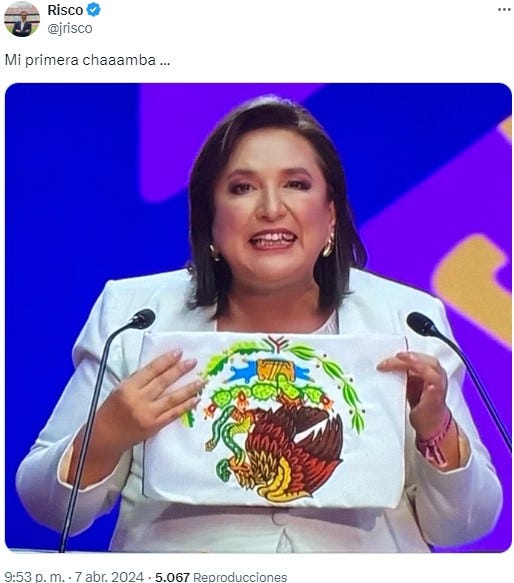


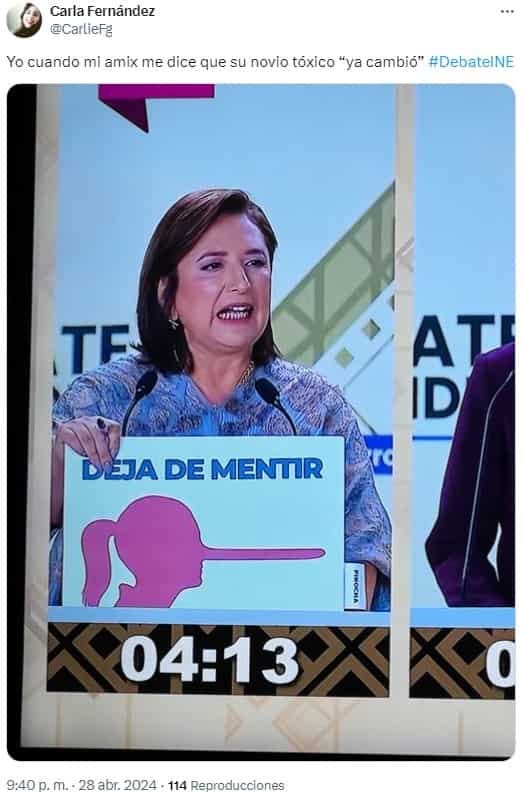
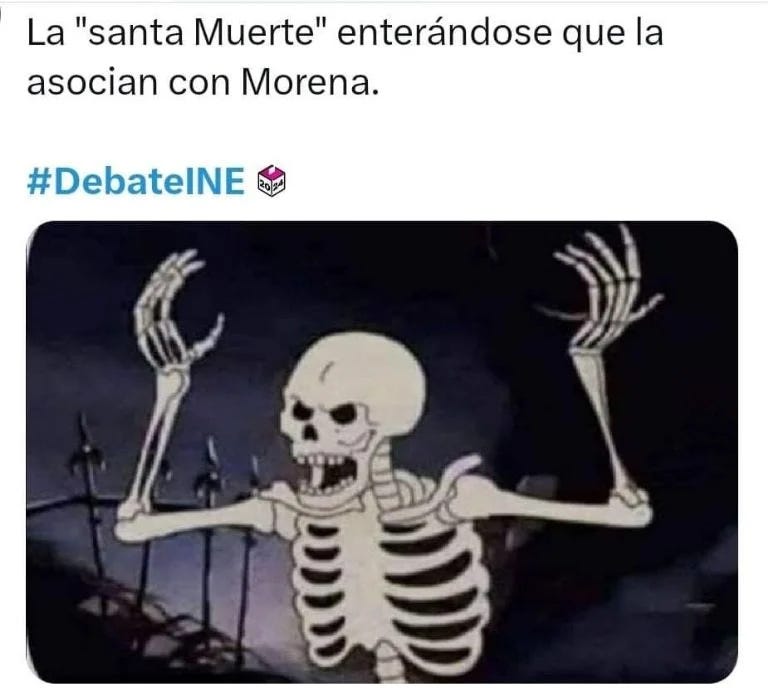


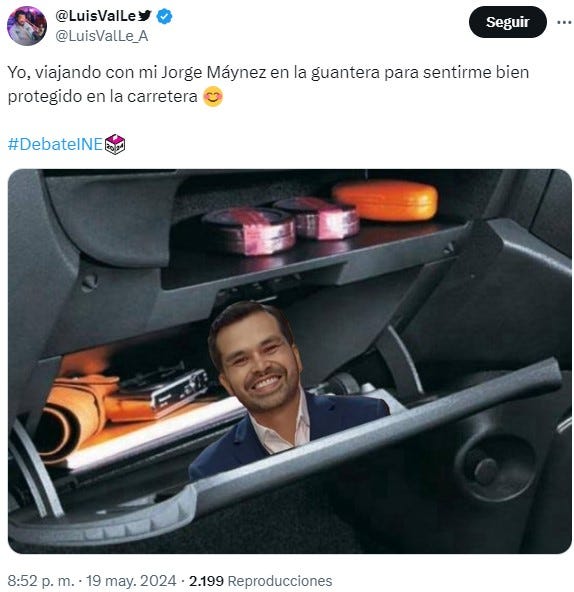



Great summary of the debates! They DID all seem a bit silly, but it’s not like we can say much more for our own. 😅 I’ll admit too, I like Maynez and his goofy/disturbing plastered grin a bit more after these.